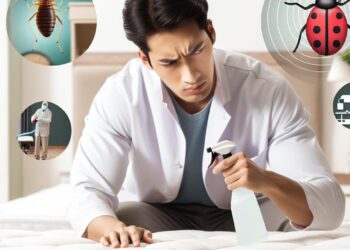The Global Landscape of Pest Control: Cultural Contexts and Practices
Pest control is a vital aspect of maintaining public health, food safety, and environmental sustainability. However, the methods and strategies of pest management vary significantly across different regions and cultures. Understanding the cultural factors that shape pest control practices is essential for developing effective and culturally sensitive solutions. In this article, we will take a look at how pest control practices differ around the world and the cultural contexts that influence them.
Cultural Contexts of Pest Control
Pest control practices are not only influenced by environmental and ecological factors but also by cultural beliefs, values, and practices. In many cultures, pests are not only viewed as a nuisance but also as a symbolic representation of disease, filth, and bad luck. For instance, in Hinduism, rats are considered sacred animals, and killing them is considered a sin. In some African cultures, termites are revered as a source of food, medicine, and spiritual inspiration. Therefore, pest control practices in these cultures have to be culturally sensitive and respectful of these beliefs.
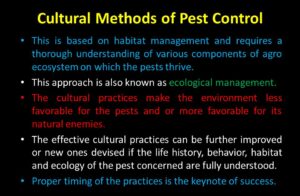
Moreover, cultural practices such as food habits, hygiene standards, and housing design also play a significant role in pest infestations. For instance, a diet rich in carbohydrates and fats can attract pests such as cockroaches and rodents, while poor sanitation and overcrowded housing can create ideal breeding grounds for pests.
Pest Control Practices Around the World
The methods and strategies of pest control vary widely across different regions and cultures. Here are some examples of pest control practices from around the world:
Pest Control in Europe: In Europe, pest control practices are primarily driven by environmental concerns and regulations. The European Union (EU) has set strict regulations on the use of pesticides to protect the environment and human health. As a result, Integrated Pest Management (IPM) is the primary approach used in pest control. IPM combines multiple control methods, including biological, cultural, and chemical methods, to reduce pest populations while minimizing the use of pesticides. Additionally, cultural factors such as the preference for organic food and natural remedies for pests have also contributed to the popularity of IPM in Europe.
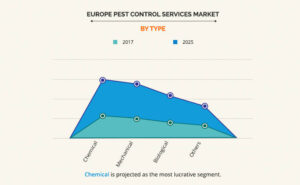
Pest Control in Asia: In Asia, pest control practices are largely influenced by cultural beliefs and practices. For example, in some Asian cultures, rats are considered a symbol of good luck, and killing them is seen as bad luck. In India, the use of pesticides is discouraged due to the belief that they may harm the environment and bring bad luck. Instead, traditional pest control methods such as the use of neem oil and other natural remedies are preferred. In Japan, the use of pesticides is limited due to the belief in the importance of a balanced ecosystem. As a result, natural pest control methods such as the use of natural predators are preferred.
Pest Control in Africa: In Africa, pest control practices are largely influenced by economic factors. Many African countries lack the resources to implement effective pest control measures, leading to high pest populations and crop losses. Additionally, cultural beliefs such as the use of traditional herbal remedies to control pests also contribute to the lack of modern pest control methods. However, there have been efforts to promote sustainable pest control methods in Africa through the use of natural predators, crop rotation, and the use of resistant crop varieties.
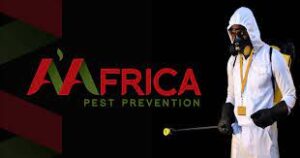
Pest Control in North America :In North America, pest control practices are dominated by the use of chemical pesticides, which are widely available and affordable. However, there is a growing concern about the environmental and health impacts of these pesticides, and alternative methods such as integrated pest management (IPM) and biological control are becoming more popular.
Challenges and Opportunities in Global Pest Control
While pest control practices around the world differ significantly, there are also common challenges and opportunities that transcend cultural and regional boundaries. One of the biggest challenges is the emergence of new and invasive species that can cause significant economic and ecological damage. For instance, the recent outbreak of the Asian giant hornet in North America has raised concerns about the potential impacts on honeybees and other pollinators.
Another challenge is the increasing resistance of pests to chemical pesticides, which can reduce the effectiveness of pest control strategies over time. This has led to the development of new and innovative approaches such as gene editing and pheromone-based control methods.
On the other hand, there are also opportunities for collaboration and knowledge-sharing among different regions and cultures. For instance, the International Association for the Plant Protection Sciences (IAPPS) is a global network of scientists and practitioners who work together to develop sustainable and culturally sensitive pest control solutions. Similarly, the Food and Agriculture Organization (FAO) of the United Nations has launched several initiatives to promote integrated pest management and reduce the use of chemical pesticides in developing countries.
Best Practices for Sustainable Pest Control
As the world becomes more interconnected and globalized, sustainable pest control practices are increasingly important to protect public health, food safety, and environmental sustainability. Here are some best practices for sustainable pest control:
- Integrated Pest Management (IPM)
IPM is a holistic approach to pest control that combines different methods and strategies to reduce the use of chemical pesticides. IPM involves monitoring and identifying pests, setting action thresholds, implementing preventative measures, and using a combination of biological, cultural, and chemical controls as needed. By using IPM, pest control practitioners can reduce the risk of pests developing resistance to chemical pesticides and protect beneficial insects such as pollinators.
- Biological Control
Biological control involves using natural predators, parasites, or pathogens to control pest populations. For instance, ladybirds can be used to control aphids in gardens, while Bacillus thuringiensis (Bt) bacteria can be used to control caterpillars in crops. Biological control methods are often more sustainable and environmentally friendly than chemical pesticides, but they require careful planning and monitoring to ensure that they are effective.
- Habitat Modification
Habitat modification involves altering the environment to make it less hospitable to pests. For instance, removing standing water sources can reduce mosquito populations, while sealing gaps and cracks in buildings can prevent rodents from entering. Habitat modification can be a simple and effective way to reduce pest populations without using chemical pesticides.
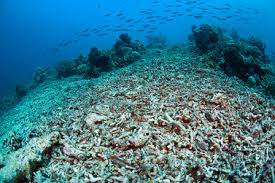
- Cultural Practices
Cultural practices such as proper sanitation, waste management, and food storage can play a significant role in preventing pest infestations. For instance, storing food in airtight containers can prevent pests such as ants and cockroaches from accessing it, while cleaning up spills and crumbs can reduce the attraction of pests. By adopting good cultural practices, individuals and communities can reduce the risk of pest infestations and promote public health.
- Education and Outreach
Education and outreach are essential for promoting sustainable pest control practices and raising awareness of the importance of pest control in public health and environmental sustainability. By providing information and training to individuals and communities, pest control practitioners can empower them to take action to prevent and manage pest infestations.
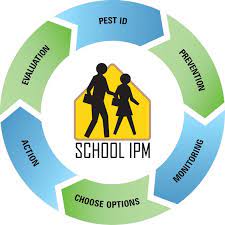
Conclusion
Sustainable pest control practices are essential for protecting public health, food safety, and environmental sustainability. By adopting an integrated and culturally sensitive approach to pest control, we can create healthier and more sustainable environments for ourselves and future generations. By using methods such as IPM, biological control, habitat modification, cultural practices, and education and outreach, we can reduce the use of chemical pesticides, protect beneficial insects, and promote sustainable pest control practices around the world.




